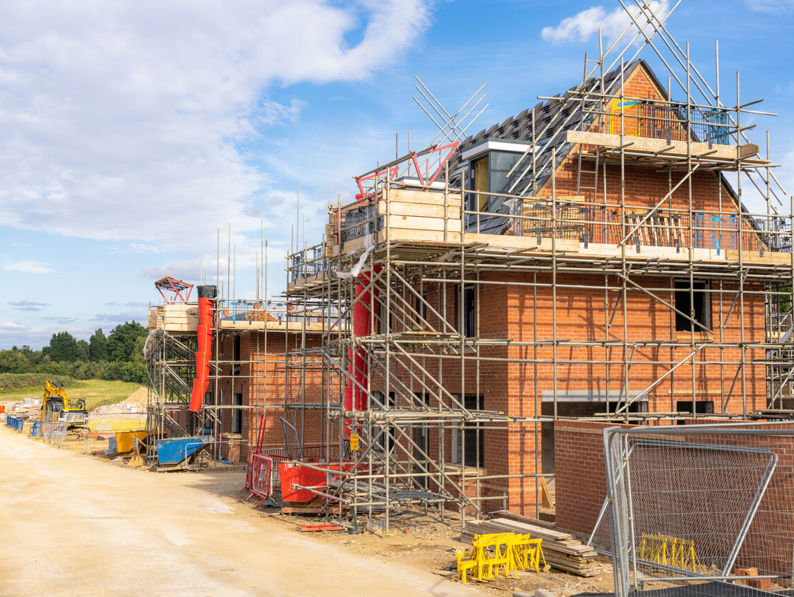Modular Construction – where it fits into UK housebuilding

As featured in Property Week
The UK has a housing supply problem. We’re simply not building enough houses to meet demand, and we do not have enough existing stock of a good enough quality. Whilst the government has tried to address the issue by introducing targets and relaxing regulations, the situation has persisted. While there is unlikely to be a one size fits all solution, there are options on the market which could play a pivotal role. One such solution is Modular Construction.
What is modular construction?
Modular construction is a building process in which parts, or modules, of a building are prefabricated and built off site. Modules are constructed beforehand, and then taken to a site to be put together and installed. This means developments can often be built more efficiently.
In a very simplified way, it can be compared to LEGO; in the sense that all the components are designed and manufactured offsite, and the pieces simply need to be connected together onsite to complete the construction.
What are the benefits of modular construction?
Though modular construction can at times be more cost-effective in comparison to standard construction, this is not the primary benefit for developers. The primary benefit of modular construction is efficiency and speed. Because modules are delivered to a construction site fully formed and simply need to be pieced together there is a huge amount of build-time saved.
This is especially beneficial for larger projects with matching units, such as flats, student accommodation and retirement living schemes.
Because modules are built off site and often in a factory environment, it means disruption and delays caused by weather, which can pause labour on standard sites, are minimised. Another important benefit is the mitigation of waste and environmental disturbance, as elements have already been built.
Current drawbacks
Although modular construction has benefits, there are also currently some drawbacks which need to be kept in mind before it is selected as the preferred option.
There is no regulation or industry guidelines and standards for modular construction at this time. Without standardisation, modular companies all build to their own specifications. This can cause issues should anything go wrong with one modular building company, as another could not simply take over the build. With many modular companies relatively new to market, it may be too much of a risk for a developer, and their lender.
Manufacturers will require advance payments, which can price smaller developers out of this market. Some lenders may also struggle to support a modular construction project until the materials are on site, ready to be pieced together, meaning any advance funds would need to come directly from the developer.
How can the industry work to make modular construction more viable?
With the UK still in the midst of a housing supply shortage, modular construction is an underutilised building method. The speed of construction and ability to quickly assemble identical units could provide the housing market with fresh stock levels and alleviate some of the pressure caused by demand far-outweighing supply.
However, lenders, manufacturers and the government all have a role to play to ensure this method is successful.
Manufacturers could lower their deposits. The level of deposit currently expected makes it less conceivable for an SME-sized developers looking to build a small number of houses, to utilise this construction method. If initial deposits were lower it may open the market up to use this route more frequently allowing more to take advantage of modular housing and help to provide quality, new stock to the market.
A key change that would significantly improve viability of modular construction is standardisation. Many are calling for the government to step in and support the industry by laying down framework and approved guidelines to build to. Standardisation would help accelerate processes and ensure that projects can be completed no matter what company is appointed on a particular build. This would provide developers and lenders with much needed confidence.
Ultimately, modular construction should become more prevalent in the UK, but it needs the cooperation of manufacturers, developers and lenders to simplify the process and make it more viable for each other. It must also be borne in mind that there is only so much that can be done without necessary government support. With the correct guidance and support, modular construction could be an effective and near-essential way of addressing the UK’s current housing shortage.
Article Author
For more articles from Terry, explore their author profile.

Terry Woodley – Managing Director of Development Finance
How can we help you?
Our team of experts across the UK are ready and waiting to speak to you about how we can help you realise your property aspirations. Use our enquiry form to get in touch, or contact the team directly through our contact page.
Related Articles

Property developers ready to unleash capital
Property developers have been withholding capital to remain flexible in the face of economic uncertainty, but since the new government the outlook looks positive and developers should have more opportunities to unleash their capital.

New council targets are the key to improving planning issues
Three-quarters of property developers believe the government setting targets for councils would unlock planning issues

The challenges property developers are facing and how they are overcoming them
Research from Shawbrook identifies the major challenges faced by property developers, and reveals 99% of developers have made changes to their business strategy in the past year to overcome these.